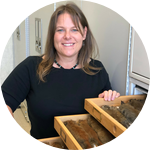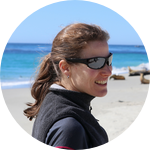About This Project
Increasing urbanization can negatively impact wildlife health and alter disease transmission, making it crucial to understand and mitigate human impacts on wildlife health in cities. I am assessing different dimensions of human impacts on coyote health, including dietary shifts and rodenticide exposure, across natural and urban landscapes in Los Angeles. A better understanding of these interactions will help direct wildlife management, public health and conservation policy.
Ask the Scientists
Join The DiscussionWhat is the context of this research?
Recent Los Angeles (LA) area research demonstrated that urban coyotes use more human associated diet sources (e.g. human food and ornamental fruit), but the health effects of this dietary shift, in conjunction with other urban impacts, such as changes in landscape use and toxicant exposure, remains unknown. Since LA is made up of very diverse environments and coyotes can inhabit a variety of landscapes ranging from natural to urban, LA coyotes present an ideal study system for the intersecting effects of urbanization, diet, rodenticides, and pathogens on wildlife health. We will assess the different dimensions of anthropogenic impacts on coyote health across a diverse urbanization matrix, with direct applications to urban pathogen control, conservation, and wildlife management.
What is the significance of this project?
Results will directly inform local veterinary, wildlife and public health agencies since coyotes are potential carriers of zoonotic diseases (which can be transmitted from animals to humans; e.g. leptospirosis) and diseases that matter for wildlife conservation (e.g. canine distemper). This study also addresses key knowledge gaps regarding the health effects of rodenticides in urban coyotes, which is relevant to local wildlife conservation since rodenticides impact more sensitive non-target wildlife (e.g. local mountain lions and bobcats, both of which have experienced fatalities due to rodenticides). Fortuitously, a recent rodenticide ban also presents a rare opportunity to assess the success of a science-based conservation policy by comparing rodenticide levels before and after the ban.
What are the goals of the project?
My project will explore the intersection of urbanization, diet, rodenticides, & pathogens in local coyotes. I will investigate how urbanization and human associated diet impact rodenticide levels by comparing diet and rodenticide exposure in coyotes from different levels of human development. I will also assess coyote health (via pathogen testing) relative to rodenticide levels and diet composition. Diet composition will be measured by stable isotopes of whiskers, and rodenticide levels will be assessed by testing liver samples. I will also compare rodenticide levels before and after a recent rodenticide ban to assess if the prevalence of rodenticides dropped, thereby informing wildlife management agencies and conservation policy planning efforts in California.
Budget
I am trying to test a total of 60 coyotes across the Los Angeles region to achieve the goals of this project (30 before & 30 after rodenticide ban AB-1788).
As part of my PhD, I have already completed pathogen testing in 30 animals before the rodenticide ban, with a suite of results that includes zoonotic diseases (e.g. Salmonella and leptospirosis) and diseases of conservation concern (e.g canine distemper). To supplement these results and answer further questions, I need to test coyote whiskers for stable isotopes (indicating how much of their diet was anthropogenic, or human associated) and liver samples (for an anticoagulant rodenticide screen). Stable isotope and rodenticide testing cost $185 and $170 per animal, resulting in a total study cost of $11,100 + $10,200 + $4500 (for pathogen testing in remaining animals) = $25,800. I have $15,000 in external funding and am hoping to supplement this to reach my goal.
Endorsed by
 Project Timeline
Project Timeline
This is a two year project. During the first year, I will collect coyote samples from throughout the Los Angeles area. I will also do diet and rodenticide testing of a selection of animals from before the rodenticide ban (enacted in 2021) to get a baseline, which we will use to compare to samples collected from 2022-2023. In the final year, I will analyze all new coyote samples, and run all analyses to answer our research questions.
Jun 01, 2022
Project Launched
Aug 01, 2022
Start coyote sample collection
Jan 01, 2023
Analyze all samples in pre-ban coyotes
Aug 31, 2023
Have collected samples from 30 new coyotes
Dec 31, 2023
Analyze samples from 30 new coyotes
Meet the Team
Team Bio
This project is a collaborative research effort between the UCLA La Kretz Center for California Conservation Science, the Lloyd-Smith Lab, the National Park Service, and the Urban Nature Research Center at the Natural History Museum of Los Angeles County.
Sarah Helman
As a veterinarian and wildlife lover, I am incredibly excited to be researching wildlife health and ecology in the greater Los Angeles region. After obtaining my undergraduate degree from Boston University in 2006 (B.A. Biology, specialization in ecology & conservation biology), I went on to veterinary school at the University of Edinburgh, Scotland (class of 2010). After graduation I worked as a small animal veterinarian in Queensland, Australia, where I volunteered with a local sea turtle rehabilitation organization and increased my interests in coastal wildlife health and conservation ecology. I decided to pursue a PhD in research focusing on wildlife health, and found the perfect fit for this in the James Lloyd-Smith zoonotic disease lab at UCLA. Since then I have utilized my background in ecology and veterinary medicine to research wildlife health and disease ecology along the California coast. After finishing my PhD in 2022, I started a 2-year postdoctoral research fellowship at the UCLA La Kretz Center for California Conservation Science, focused on how diet and rodenticide exposure influence local coyote health and ecology. These surveys are a critical step in identifying the prevalence of diseases in different mammal populations and understanding factors that impact diseases in wildlife, and results will directly inform wildlife, veterinary and public health agencies. I'm extremely grateful to be working on such an exciting project with an amazing team of collaborators and fantastic undergraduate students (the future doctors and scientists of the world) as we continue to learn more about the health and ecology of local wildlife populations.
Thanks for your interest!!
Additional Information
Note: All liver and whisker samples will be obtained from animals that died or were euthanized due to other causes (e.g., traffic fatalities).
Project Backers
- 99Backers
- 100%Funded
- $6,313Total Donations
- $48.62Average Donation



